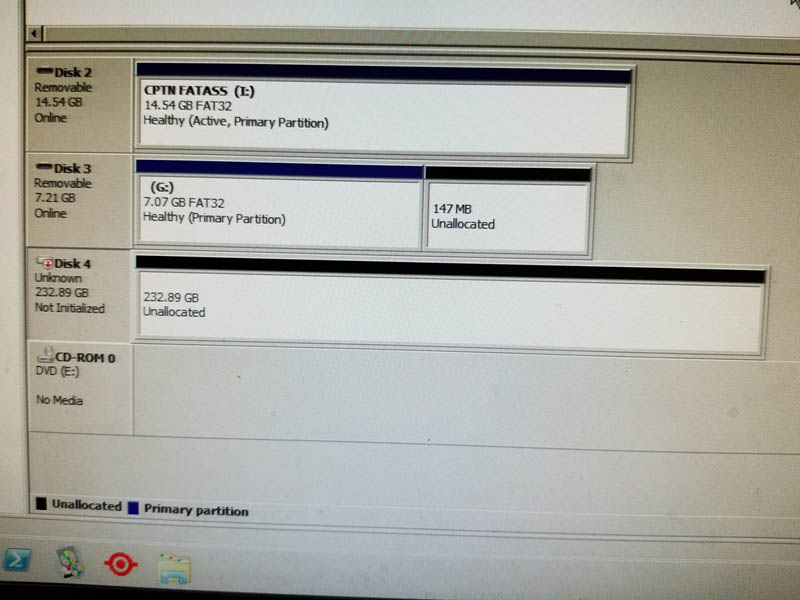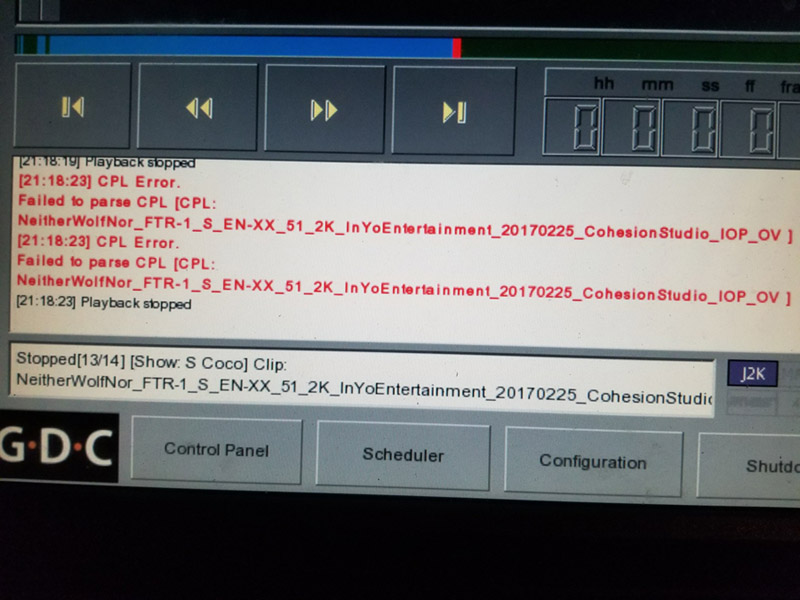|
|
 
|
|
Author
|
Topic: CPL error Failure to parse CPL - help with error
|
|
|
Carsten Kurz
Film God
Posts: 4340
From: Cologne, NRW, Germany
Registered: Aug 2009
|
 posted 01-05-2018 09:16 AM
posted 01-05-2018 09:16 AM




I guess it is void to speculate - you have to send them a new drive, and try to get a hand on that problematic drive. The fact that windows drive manager does not recognize the drive as being formatted means nothing, as that is normal when you try to mount an ext drive in windows (even with ext reader software being present). I can only assume something happened to the drive over it's tour to various cinemas.
Even if this will probably turn out to be a drive issue, inquire the specific server and TMS type and software version, so you may be able to find a pattern if the issue turns up again.
We never had a dysfunctional drive at our own cinema, but it does happen also with drives from major mass duplicators. Drives on the move just fail or get corrupted occasionally. You have to be prepared and have backup drives at hand if that happens, and take the time for analysis later.
The only thing that caught my eye on this specific CPL is that the studio and facility names are exceptionally long (to prevent issues with file or path names being too long, abbreviated codes loosely managed by ISDCF are normally used).
http://isdcf.com/dcnc/home/appendix-5-studio-codes.html
http://isdcf.com/dcnc/home/appendix-6-facility-codes.html
In theory, your CPL could cause issues on a server with a whacky software version. But I guess it wouldn't prevent the drive from being recognized on the TMS server. Still, you should use abbreviated studio and facility codes in the future. That said, as other elemts of your CPL name are rather short and limited, the CPL name as a whole doesn't appear to me as being exceptionally long, so I doubt this causes the problem.
- Carsten
| IP: Logged
|
|
|
|
|
|
|
|
|
|
Leo Enticknap
Film God

Posts: 7474
From: Loma Linda, CA
Registered: Jul 2000
|
 posted 01-06-2018 07:42 PM
posted 01-06-2018 07:42 PM





I've actually floated the idea in the past of a "FestTMS" system, consisting of a very powerful laptop with a built-in BD drive, plus an external box containing, say, a 4-drive RAID and a CRU bay.
The laptop would have a dedicated, Linux based software image consisting of the OS plus the application. The application would enable DCPs to be ingested, either from CRU, USB or a network source (e.g. FTP) into the RAID, checking it for compliance with all the relevant standards in the process. This software would also be able to read the commonly encountered drives with formats that violate ISDCF rules (e.g. HFS+, NTFS), but which have otherwise valid DCPs on them.
You would be able to open individual festival projects, specifying which servers, projectors and audio systems (with their software versions) are installed in each of the houses that will be used for the fest. As each DCP is ingested to the RAID box, you specify which house it is scheduled to play in, and which are possible backups/last minute move destinations. The software will then say, "OK, but this DCP might not play in the Bijou screen 2 unless the server's software is updated to 4.9," or something like that.
At the end of the ingest process, it will give you a complete listing of what DCPs are good to play, what may need bugs resolving in the scheduled theater, which are suspect (e.g. called something like "My DCP," so you have to look at it to see what it is), what KDMs will be needed, etc. As you ingest KDMs into the system, it will track them. When the ingestion is done, it will enable you to write a single CRU drive (or multiple ones, if the total DCPs for each house exceeds 2TB), guaranteed ISDCF-compliant, containing all the content for each auditorium, which you then ship to the theater. It would also be able to upload via FTP, if the theater(s) support that.
During each night, the system could be able to copy the following day's content onto the laptop's internal storage, so the fest's technical director could then carry it around with him or her, ready for instant reingest via LAN in the event of accidental deletion from the screen server.
It would also include the facility to ingest BDs and other non-DCP content (e.g. ProRes) files, then automatically render DCPs from them and add them to the relevant theater's schedule and drive.
Such a system would be possible to build: the main investment would be in software development, and it's possible that there wouldn't be a large enough market for it. But I know a lot of people who would love to have such a thing, if it could be developed.
| IP: Logged
|
|
|
|
|
|
Carsten Kurz
Film God
Posts: 4340
From: Cologne, NRW, Germany
Registered: Aug 2009
|
 posted 01-07-2018 12:57 PM
posted 01-07-2018 12:57 PM




This approach already fails at frame rates like 50 and 60 fps, where you need to know the specific server and projector setup in oder to let it pass or fail - and we see many of those 'HFR' DCPs as festival entries.
Also, who defines the disc format? Prefer a 'whacky' ext drive created with an alien ext software,, or an NTFS drive, which has never been spec'd for DCI use, but is supported by all servers?
I have seen entry regulations for high profile festivals, no problem for these to set through very tough constraints (like delivery of two CRU drives, 24fps only, SMPTE), but that works for a special type of festival only.
- Carsten
| IP: Logged
|
|
|
|
|
|
|
|
All times are Central (GMT -6:00)
|
|
Powered by Infopop Corporation
UBB.classicTM
6.3.1.2
The Film-Tech Forums are designed for various members related to the cinema industry to express their opinions, viewpoints and testimonials on various products, services and events based upon speculation, personal knowledge and factual information through use, therefore all views represented here allow no liability upon the publishers of this web site and the owners of said views assume no liability for any ill will resulting from these postings. The posts made here are for educational as well as entertainment purposes and as such anyone viewing this portion of the website must accept these views as statements of the author of that opinion
and agrees to release the authors from any and all liability.
|

 Home
Home
 Products
Products
 Store
Store
 Forum
Forum
 Warehouse
Warehouse
 Contact Us
Contact Us




 Printer-friendly view of this topic
Printer-friendly view of this topic












